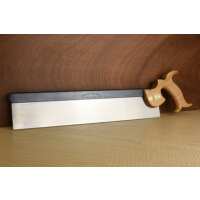
The bayonet is to carcase saws as the stiletto is to dovetail saws; a longer, lower, leaner version aimed squarely at the professional and serious amateur woodworking market.The long stroke brings a wonderful easy fluidity to your sawing action; it also means you can have finer teeth that leave a clean finish without compromising efficiency.The plate is shallow, just 2 inches below the spine, you could be forgiven for thinking this might be restrictive, but for the vast majority of furniture work it is plenty. What shallow plates give back is accuracy and rigidity; and when you can calmly and confidently remove everything to one side of a knifed line your productivity goes through the roof.Fans of Japanese saws will be familiar with the efficiency benefits of having a thin plate that makes rapid progress because it has less material to remove. 0.018" is about 0.45mm; the same sawplate thickness as a good quality Japanese ryoba. The teeth of the bayonet are hybrid filed at 14ppi (15tpi), which gives about 80% of the efficiency of an all out rip or crosscut pattern, an eighth inch of cant on the toothline probably adds back about 20%, so in net terms you are giving up nothing compared with a dedicated rip or crosscut saw.Can you dovetail with it? Sure, why not? 14ppi is well within the range for dovetail saws, it is shallow enough and hybrid teeth are smoother starting than a full rip.So instead of buying separate dovetail and tenon saws, I could use this one sublime saw for all of my benchwork to make carcases, drawers, chairs, tables etc?Exactly.
Filing: Hybrid-Cut
Pitch: 14ppi,
Plate: .018 Gauge
Spine: Black Oxided Steel
Handle: American Hickory
Fixings: Brass Slotted-Nuts,
Handle Size: Regular

